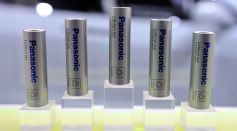ENERGY

Will This Energy-Saving Transparent Wood Replace Your Typical Glass?

Arranged Nanoblocks Help Improve Solar Cell Efficiency

Construction Begins on the Largest Solar Energy Farm in Texas

Computer Scientists, Energy Tech Experts Collaborate in Making Solar Energy More Efficient

Engineers Devise Machines to Remove CO2 from the Air, Could Potentially Stop Climate Change
Nanomaterials Improve Hybrid Flow Battery Electrodes, Advancing Renewable Energy Storage
Too Small, Too Cool: NIST Scientists Miniaturize Laser Cooling
Rock-Star Material Could Become Cheaper Alternative for Solar Cells

Lab-Grown Plants: MIT Makes Better Alternatives to Forestry and Farming

Scientists Finally Detected The Dark Matter Escaping From Neutron Stars
Are Solar Panels For Your Home Worth It?

Floating Power Station: Ex-NASA Researcher Develops Unlimited Clean Power for Earth
New Super-Absorbent Film Uses Sweat to Power Wearable Devices

Supercapacitor Development Makes Them Worthy Challengers to Batteries
Most Popular

Sun Rotation Explained: How Long It Takes the Sun to Spin at Different Latitudes

The Wow! Signal Mystery: A Deep Space Radio Signal Scientists Still Can't Solve

Electric Car Motion Sickness: What Causes it and How to Stop It

Ocean Temperature and Winter Storms: How Sea Surface Temperatures Fuel Extreme Weather and El Niño Snowstorms




